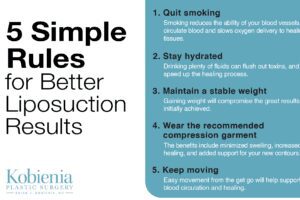
Whether you have put on the “freshman 15” or have seen your waistline grow slowly over the years despite eating healthy and exercising, you may have considered liposuction. But what if you are more than just a few pounds overweight? Liposuction can help you get thin, right? The short answer is “no.”
It makes sense to think that liposuction could be an alternative form of weight loss. However, let’s take a closer look at why liposuction isn’t meant for weight loss, but could still help with your weight loss journey.
Different Types of Fat
To understand why liposuction is not for weight loss, you must first understand the different types of fat in your body. You have two types of fat: subcutaneous and visceral. Subcutaneous fat is the layer of fat immediately under the epidermis layer of your skin. This fat makes up 90% of the body fat in the typical person.
Visceral fat makes up the remaining 10% and is the fat that is found deeper within the body. In the abdominal area, this fat fills in spaces around the organs. When you work to achieve a healthy weight, you are primarily targeting the subcutaneous fat in order to drop pounds and improve your health.
Liposuction Focuses on Specific Areas of Subcutaneous Fat
Liposuction targets areas of subcutaneous fat such as love handles or excess bulging fat on the thighs, back, and other areas. The idea is to remove fat that hasn’t responded to a healthy diet and regular exercise. The purpose of liposuction is to simply improve your body contours by removing this subcutaneous fat and tightening the skin.
While you may lose a few pounds after liposuction, the procedure simply isn’t designed to remove large volumes of fat all at once, and doing so simply isn’t safe.
Dr. Brian Kobienia and his amazing team are here to help you better understand liposuction and how it can help you achieve your goals. If you would like to learn more about liposuction, call our office today at (612) 930-1111 to schedule a consultation.





